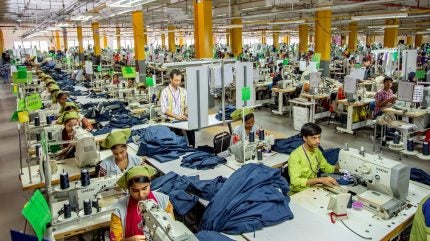
The statement was made as the delegation concluded their visit, which aimed to show support for the nation’s economy, democratic processes and labour force. It was headed by Kelly Fay Rodríguez, special representative from the State Department, alongside Thea Lee, deputy undersecretary from the Department of Labor.
Participants also included representatives from the US Agency for International Development (USAID), senior executives from major US brands linked to the American Apparel and Footwear Association, and international labour specialists such as Christy Hoffman, general secretary of UNI Global Union, and Scott Nova, executive director of the Worker Rights Consortium.
Three major US companies namely Gap, PVH, and VF, which collectively source around $1.8bn per year from Bangladesh’s garment industry, were part of the delegation.
A statement from the US Embassy of Bangladesh said that empowering workers plays a vital role in achieving sustainable economic progress, upholding human rights, reinforcing democratic stability and promoting gender equality.
The US also acknowledges that ensuring the welfare of workers within the global economy is a collective obligation involving governments, buyers, employers, regulators, and labour unions. This encompasses providing safe working environments where workers’ rights are honoured with enhanced labour rights, particularly concerning freedom of association and collective bargaining within the garment sector.
The delegation showed its appreciation for chief advisor Muhammad Yunus’s commitment to prioritising labour reforms under the interim government. It also reiterated the US’s support for Bangladesh’s efforts to enhance workers’ rights, to establish and join independent trade unions and negotiate collectively for improved working conditions.
The US delegation reportedly conducted individual meetings with the chief adviser, officials from the foreign, labour, and commerce ministries, leaders of trade unions, and representatives of the Bangladesh Garment Manufacturers and Exporters Association.
The commitment of the US extends to collaborating with Bangladesh to foster industry practices that promote stable employment, acceptable working conditions, and living wages that enable Bangladeshi workers and their families to prosper.
“The United States values our partnership with Bangladesh, spanning more than 50 years. We are grateful for the opportunity to support the people of Bangladesh at this historic moment, and for the chance to join here together in Dhaka to affirm our shared commitment to independent, democratic trade unions, for Bangladeshi workers and the businesses that employ them,” the embassy statement read.
According to local news publication The Daily Star, the American Chamber of Commerce in Bangladesh (AmCham) presented findings of the research titled “Development of Labor Conditions in Bangladesh for Sustainable Growth” during a networking programme hosted for the delegation.
The study, which was unveiled in May, examined labour conditions in Bangladesh, focusing on their alignment with international standards and relationships, especially with the EU and the US.
The report offered several important recommendations, such as addressing the impact of the varied wage system, reforming labour unions, clarifying labour definitions and roles, proposing the establishment of a Ministry of Human Resource Development, expanding focus beyond the garment industry, and revising wage adjustment policies.
The latest Swedwatch report, titled ‘Paying the Price for Fashion: Securing a Living Wage for Bangladesh’s Garment Workers,’ called on fashion brands to address the issue of low wages in Bangladesh’s garment sector. It provided recommendations for global fashion brands and policymakers, proposing a timely framework for implementing meaningful change.




